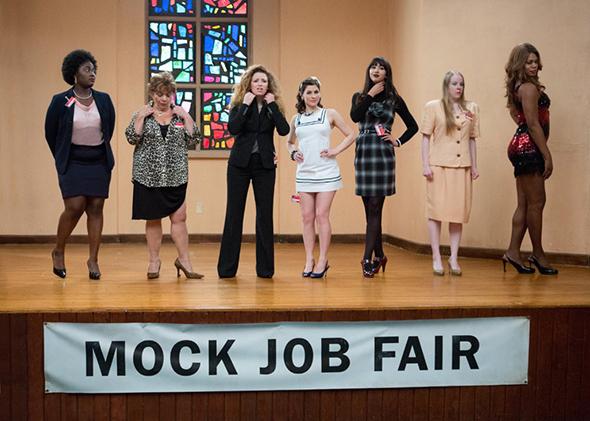Orange Is the New Black, Netflix’s most watched original series, is set inside a low-security women’s prison, among trapped, powerless, depressed female inmates who have little to no control over their lives, whether in the clink or out. It is nonetheless delectable, demolishable, hooverable, gorgeable, bingeable—as reliably delightful as its setting is bleak. The series, the entire second season of which Netflix releases Friday, almost defies logic: How can a show that doesn’t shortchange the physical hardships, the emotional limitations, and the Kafkaesque circumstances facing its characters be so much fun? Given lemons, the women of Litchfield Correction Facility would be more likely to make weapons or sexual aids than lemonade, but Jenji Kohan and the other writers of Orange Is the New Black know how to brew some ambrosial prison hooch.
Orange finished its first season with Piper Chapman (Taylor Schilling), Smith graduate turned inmate, pounding the face of zealous meth-mouth Pennsatucky (Taryn Manning) into hamburger. The new season picks up a few weeks later, with Piper released from solitary confinement and transported to an unknown facility. Piper and her on-again-off-again flame Alex Vause (Laura Prepon) are the episode’s only familiar characters. Instead of Taystee, Nichols, Poussey, Red, and the rest of the girls, we are instead introduced to a whole new cast of inmates, a fleet of messenger cockroaches, and a leering male prisoner who, Piper thanks God, is only a hit man, not a rapist. This out-of-the-bottle episode would make audiences livid if Orange were meted out week by week: The new characters are vivid enough, but I haven’t been waiting a year to see them. Yet Orange’s delivery method—instead of waiting a week, just click—turns the premiere into a kind of winking provocation: Just try not to watch the next one.
It’s also a reminder that the number of under-explored characters this show (and not just this show) could avail itself of is practically limitless. As she was in the first season of the show, Piper is a Trojan horse: a blond, white, rich, thin, bisexual Trojan horse, pulling audiences (and executives) into a far more diverse world than is usually presented on screens, full of women of all ages, races, classes, body types and sexual orientations. Orange, more than most series, is on a social mission. It’s an actively feminist, humanist show that believes in the power of representation. That do-gooderism would sink lesser series, but Orange approaches it with the right, eye-rolling spirit: Duh, it’s not just the skinny white girl who’s interesting.
This season, with Piper somewhat adjusted to prison life—and the love triangle swirling around her slowed—she cedes much of the action to other characters, like the attention-loving Taystee (Danielle Brooks), who, along with Poussey (Samira Wiley), is half of the show’s most moving, fragile friendship; Morello (Yael Stone), whose unsettling backstory is the show’s most surprising; and even a new, loquacious Asian inmate (Kimiko Glenn) who proves that Piper does not have a monopoly on narcissism. The first six episodes feature more hijinks than heavy drama: Big Boo (Lee Delaria) and Nichols (Natasha Lyonne) stage a sex contest; the black chicks play Celebrity, over and over; Sophia (Laverne Cox) schools her peers on female anatomy; Red (Kate Mulgrew) deigns to eat with the Golden Girls. But a crisis is brewing. Red’s demotion from the kitchen last season has created a power vacuum that seems likely, as with everything underpinning social life in Litchfield, to explode along racial lines.
There is something occasionally corny about the first six episodes of the new season, and not just the one that has all the inmates provide their own definitions of “love.” OINTB’s generous ethos means its characters possess all imaginable qualities, except any that are truly dull or reprehensible. There is a kind of sameness, not in the characterizations, but in the demands on our sympathy, which are near total. (Even Pennsatucky and Daya’s horrible mother Aleida get kind of cute this season.) The show always makes the mitigating case for the characters’ past mistakes. Almost every woman is a good person who made or was forced to make a bad decision, instead of something more sinister, more evil, or even more banal—as if these too were not human characteristics. In this series about convicted felons, the only characters with unforgiveable flaws are the guards.
But if this sentimental streak is a little soft-headed, it springs from the series’ huge heart and its expansive humanism. These are women barely considered by society. Orange leaves being dismissive of them to everybody else. On this show, the prisoners’ hair might not be done, their makeup certainly isn’t on, and they are wearing unflattering duds—but their hearts almost always look good.
